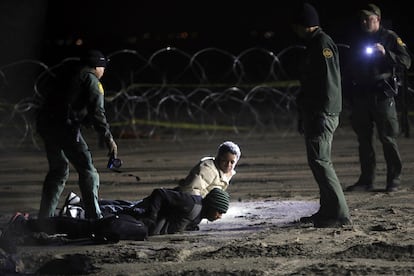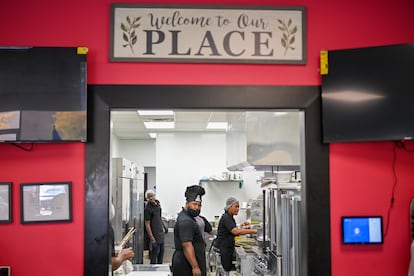What Trump has in store for Latinos: Mass deportations, no more humanitarian parole or DACA, and other threats
Statements made during the campaign by the president-elect augur a dark outlook for a large part of this demographic group


Donald Trump’s overwhelming victory in the presidential elections would not have been possible without the support of Latinos. The shift by the Hispanic electorate — traditionally aligned with the Democratic Party — has bolstered the victory of the same man who spoke out against immigration.
The xenophobic discourse that the Republican spread throughout the campaign includes branding migrants as “criminals” who “poison the blood of the country.” President-elect Trump has even claimed — with statements more typical of Nazi ideology — that they have “bad genes.” And (although Trump has distanced himself from the plan) it is expected that Project 2025, put together by a group of radical followers who prioritize ending immigration, will be a guide for his governing policy.
Latinos who are American citizens and have voted for Trump don’t feel threatened by the former president. However, if he fulfills all his anti-immigration promises, there are estimates that some 19 million Latinos could be affected. And it’s not just undocumented migrants who would be subject to the largest deportation in history, but also their spouses, children, and other relatives.
These are some of the threats made by the man who will be the 47th president of the United States:
The largest deportation in history
The center of Trump’s campaign stump speech was to promise that, if he reached the White House, he would carry out the largest deportation of undocumented migrants in history. This would affect some 11 million people.
Trump supports the so-called “Operation Aurora” — through a law used in times of war — which contemplates the expulsion of enemies who invade the United States. Since it was enacted at the end of the 18th century, this law has only been applied on three occasions: the War of 1812, World War I and World War II. Latino civil rights organizations have warned that the operation wouldn’t be limited to migrants who don’t have American documents.

On numerous occasions, Trump has compared undocumented migrants to criminals who steal, kill and rape. He considers them to be enemies of the country and also accuses them of replacing American workers and causing unemployment. This is despite the fact that studies indicate a mass deportation would be very negative for the U.S. economy. Undocumented migrants often take jobs that American citizens don’t want to do. Many, for instance, work as agricultural laborers. They also pay their taxes and help maintain Social Security… despite not benefiting from it.
End of the DACA program
In 2017, during his previous presidency, Trump wanted to eliminate the DACA program. However, the Supreme Court prevented him from doing so, despite admitting that the president has the authority to annul it. The program — approved in 2012 during the Obama administration — granted residence and work permits to migrants who arrived in the country without documents when they were children. At the request of several states governed by Republicans, a Texas judge stopped the program, which is no longer accepting new applicants. Those who accessed it in time — some 580,000 beneficiaries — can continue to renew it every two years.
The so-called “dreamers” have been in the U.S. for more than two decades. They’re professionals who have formed families and put down roots: deportation would expel them from what they consider to be their country.
End of the Keeping Families Together program
Approved by Joe Biden in June of this year, the Keeping Families Together program became the largest immigration reform of his administration. It began granting residency to the spouses of American citizens, but was interrupted a few days later by a federal judge in Texas, at the request of Republican Attorney General Ken Paxton, who led 15 Republican states in opposition. Trump opposed the program and accused Biden of granting a “massive amnesty” to “criminals” who entered the country illegally. Half a million people, along with their children, could benefit from the program, which is also known as parole in place.
To access the program, applicants must have lived in the United States for at least 10 years and have been married to a U.S. citizen before June 18. They must not pose a national threat or have a criminal record. On average, applicants have lived in the United States for over two decades.
Goodbye to TPS
“Springfield is such a beautiful place. Have you seen what’s happened to it? It’s been overrun. You can’t do that to people. I’d revoke [temporary protected status] and I’d bring [the migrants] back to their country,” Trump said last month, during an interview with NewsNation.
TPS protects about 330,000 people who — if returned to their countries of origin — would suffer violence, famine, the consequences of natural disasters, or other life-threatening conditions. The largest group of TPS beneficiaries hail from El Salvador (195,000 people), followed by Honduras (57,000 people) and Haiti (50,000 people).
In his only presidential debate with Kamala Harris, Trump spread the infamous hoax that Haitians living in the city of Springfield, Ohio, were eating pets and causing violence in the city.

No more humanitarian parole
Some 530,000 people have arrived in the country under the protection of the humanitarian parole program, which allowed for the entry of migrants from Venezuela, Cuba, Nicaragua, and Haiti. Approved in 2022, it granted asylum to Venezuelans fleeing the regime of Nicolás Maduro, provided they had a financial sponsor, could pass a background check, and purchase a plane ticket to fly to a U.S. airport. Trump considers them “illegal immigrants” and has criticized the Biden administration’s decision to grant them work permits.
End birthright citizenship
The president-elect has promised to end automatic citizenship for children born in the United States to immigrants who are in the country illegally… a plan that contradicts how a 19th-century amendment to the Constitution has long been interpreted. In a video posted on X, Trump said the policy is a magnet for migrants coming from prisons and mental institutions. “On day one, I will sign an executive order that children of illegal aliens will not receive automatic citizenship,” he promised.
Sign up for our weekly newsletter to get more English-language news coverage from EL PAÍS USA Edition
Tu suscripción se está usando en otro dispositivo
¿Quieres añadir otro usuario a tu suscripción?
Si continúas leyendo en este dispositivo, no se podrá leer en el otro.
FlechaTu suscripción se está usando en otro dispositivo y solo puedes acceder a EL PAÍS desde un dispositivo a la vez.
Si quieres compartir tu cuenta, cambia tu suscripción a la modalidad Premium, así podrás añadir otro usuario. Cada uno accederá con su propia cuenta de email, lo que os permitirá personalizar vuestra experiencia en EL PAÍS.
¿Tienes una suscripción de empresa? Accede aquí para contratar más cuentas.
En el caso de no saber quién está usando tu cuenta, te recomendamos cambiar tu contraseña aquí.
Si decides continuar compartiendo tu cuenta, este mensaje se mostrará en tu dispositivo y en el de la otra persona que está usando tu cuenta de forma indefinida, afectando a tu experiencia de lectura. Puedes consultar aquí los términos y condiciones de la suscripción digital.








































